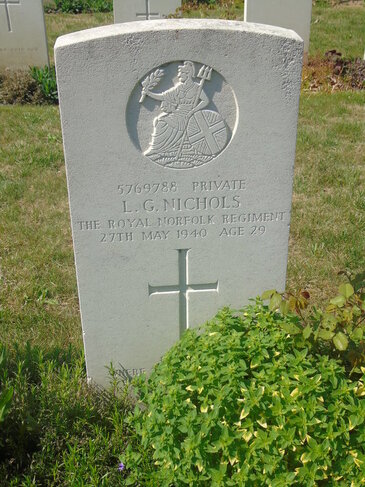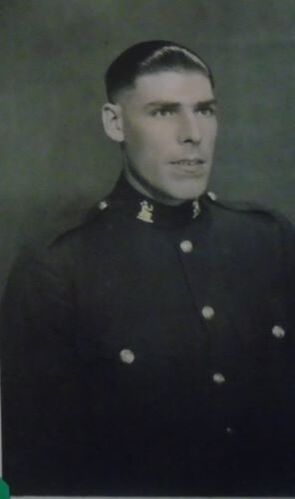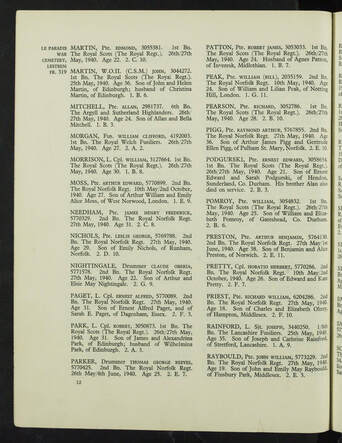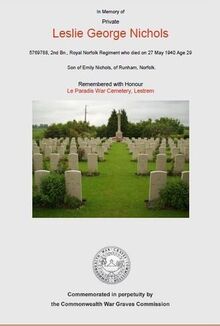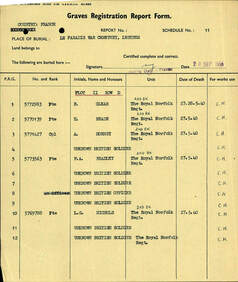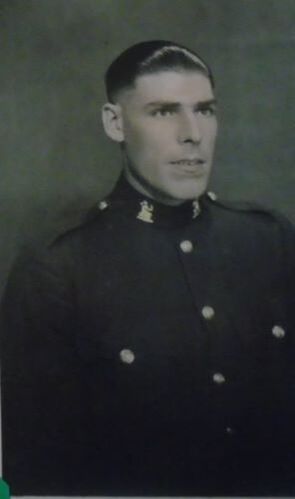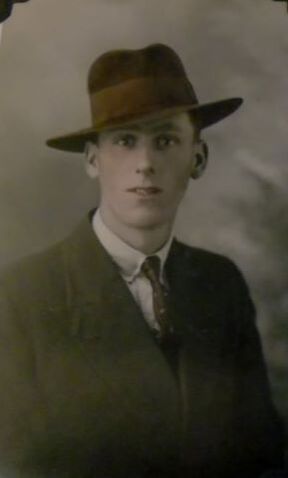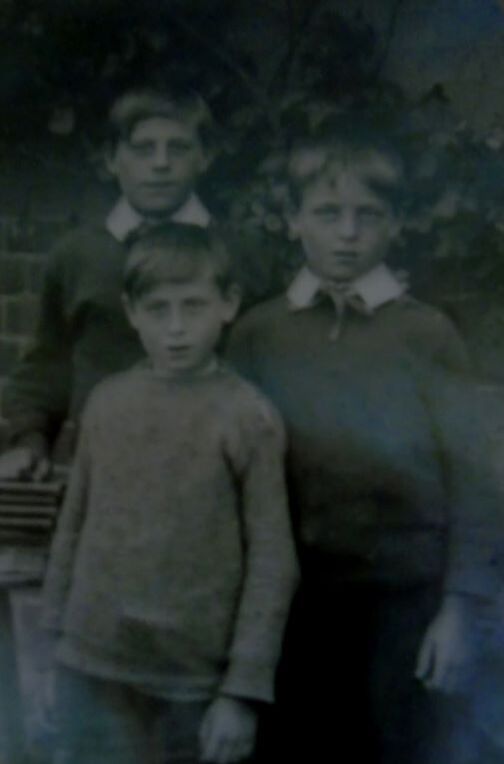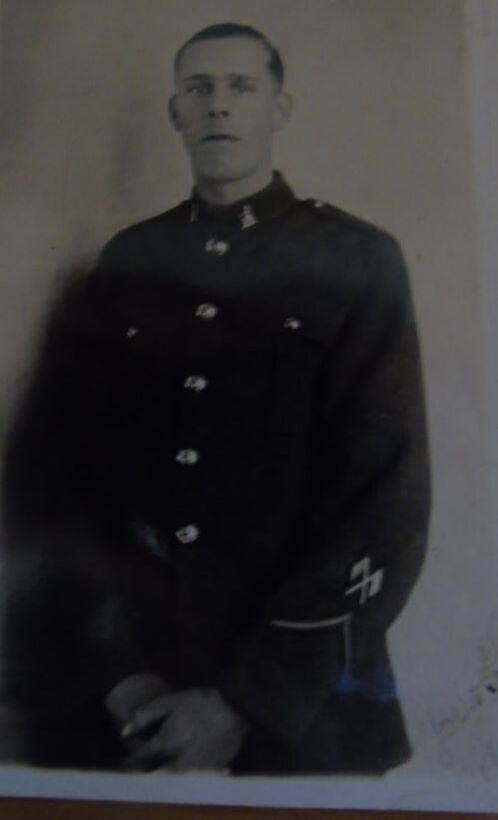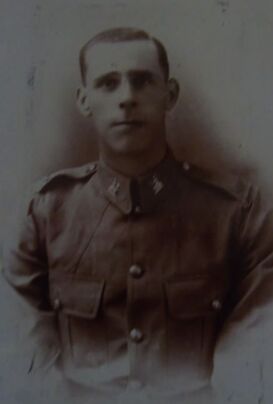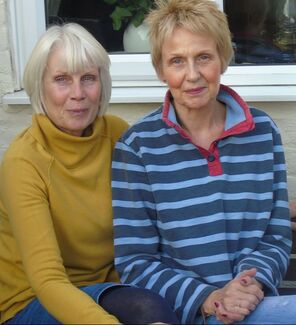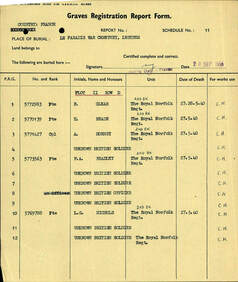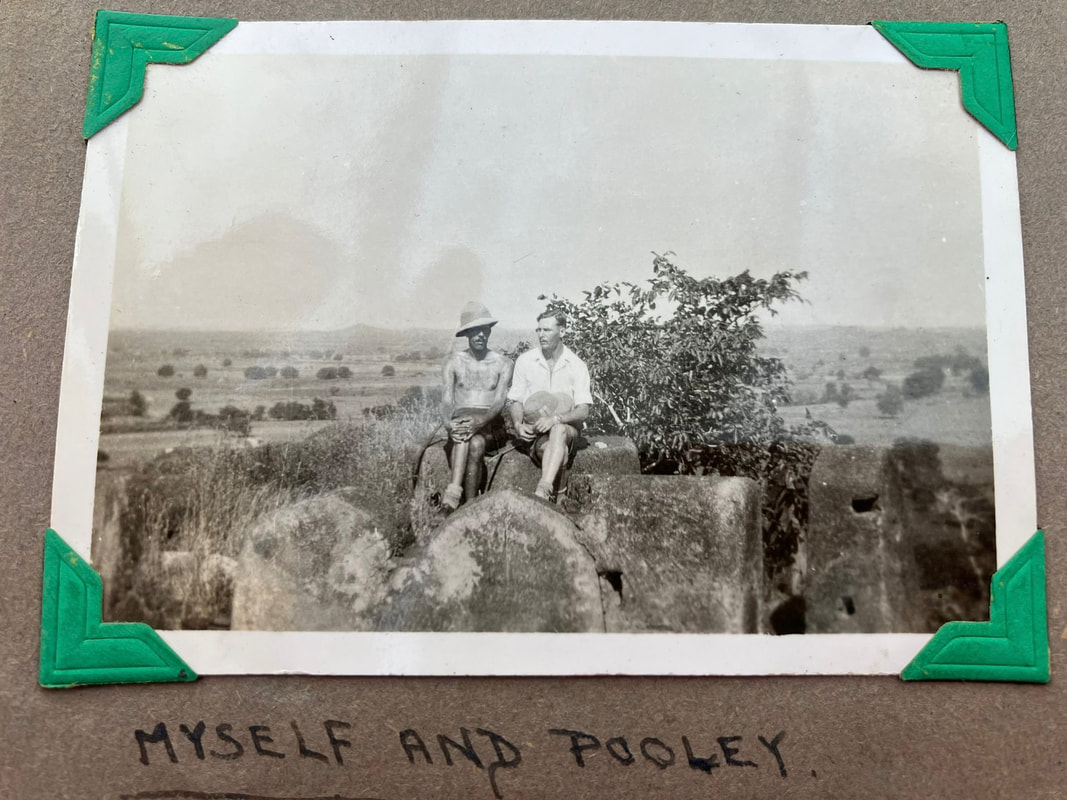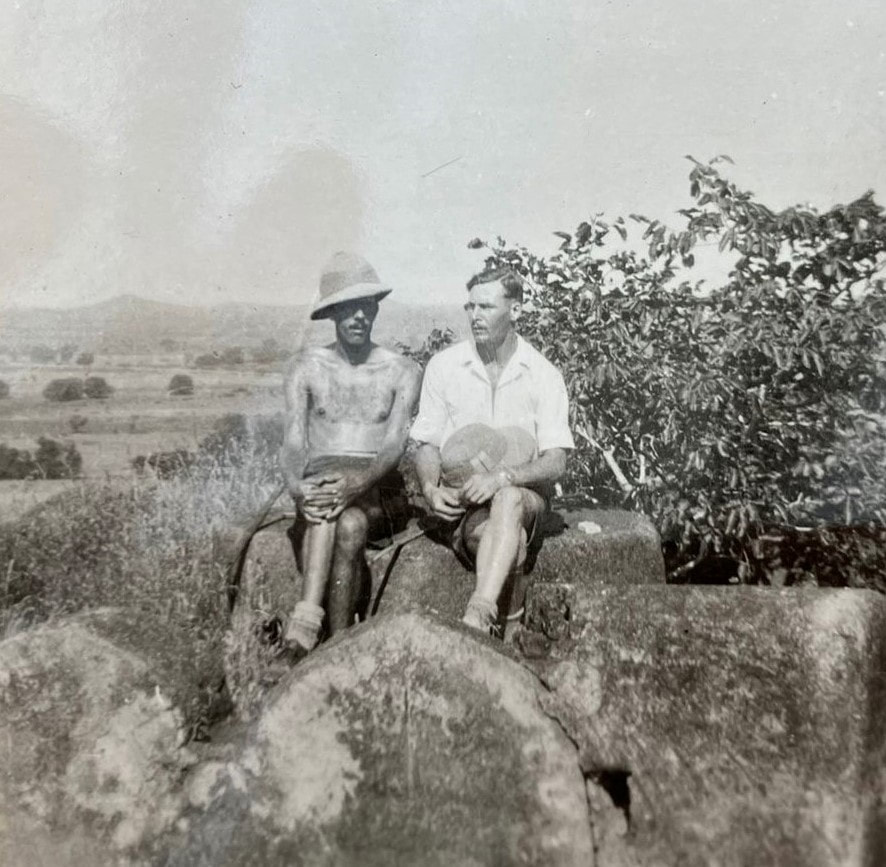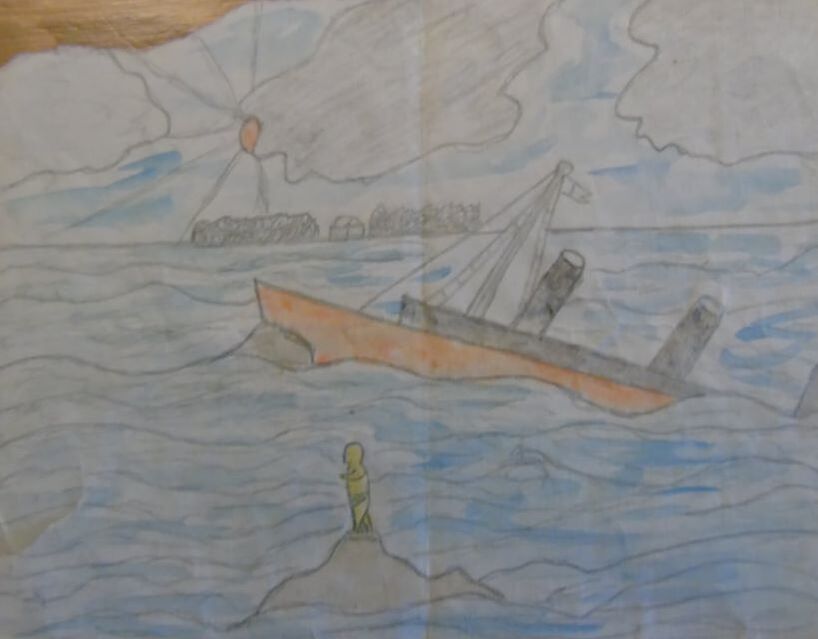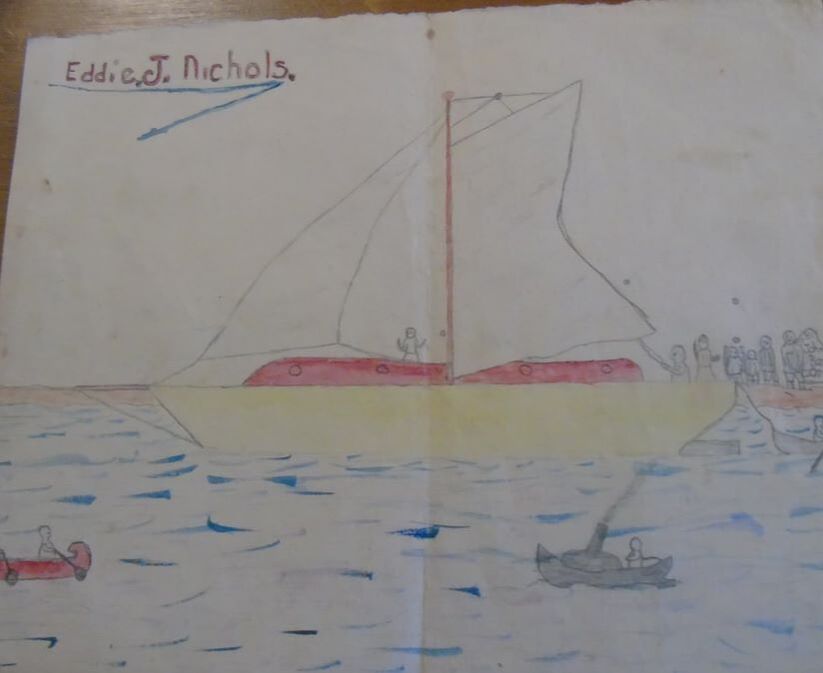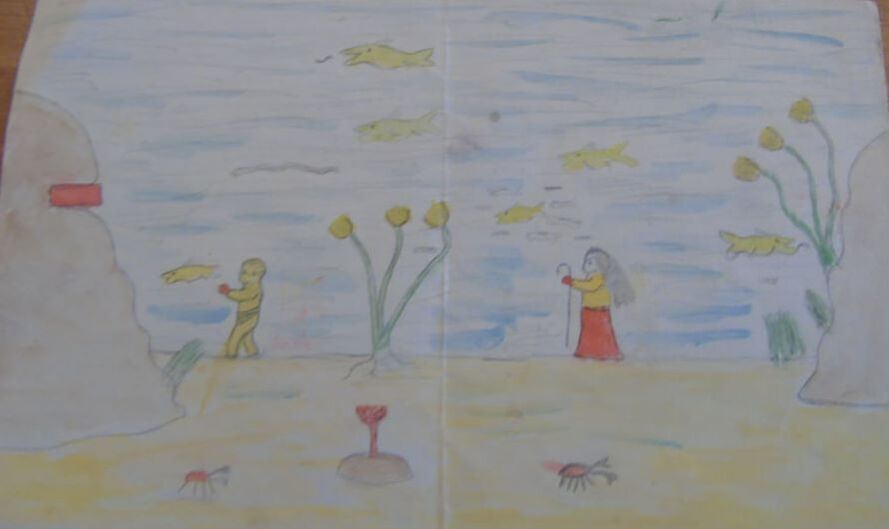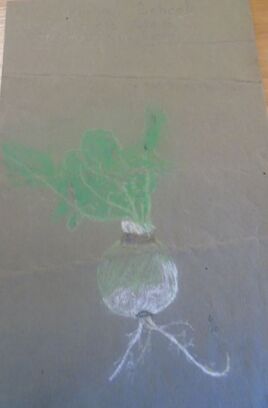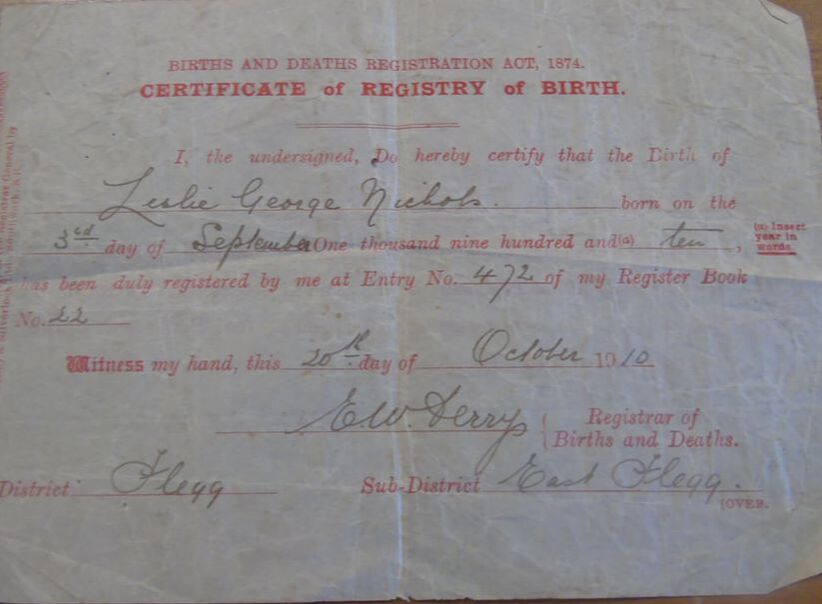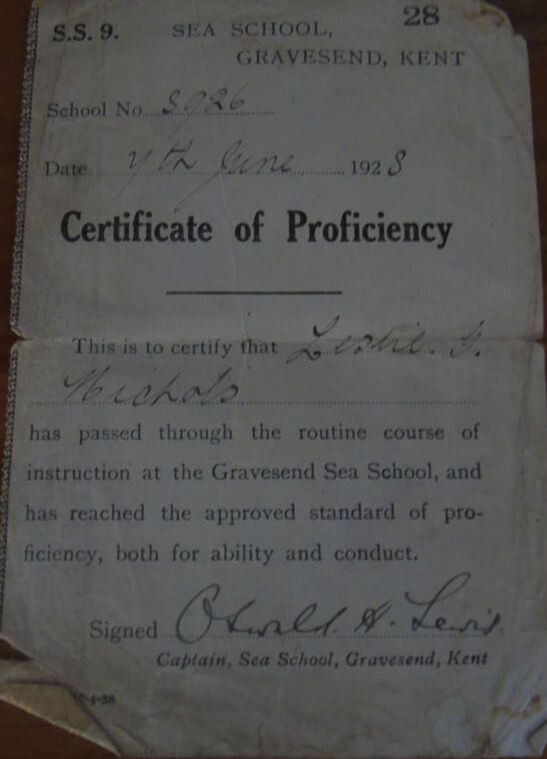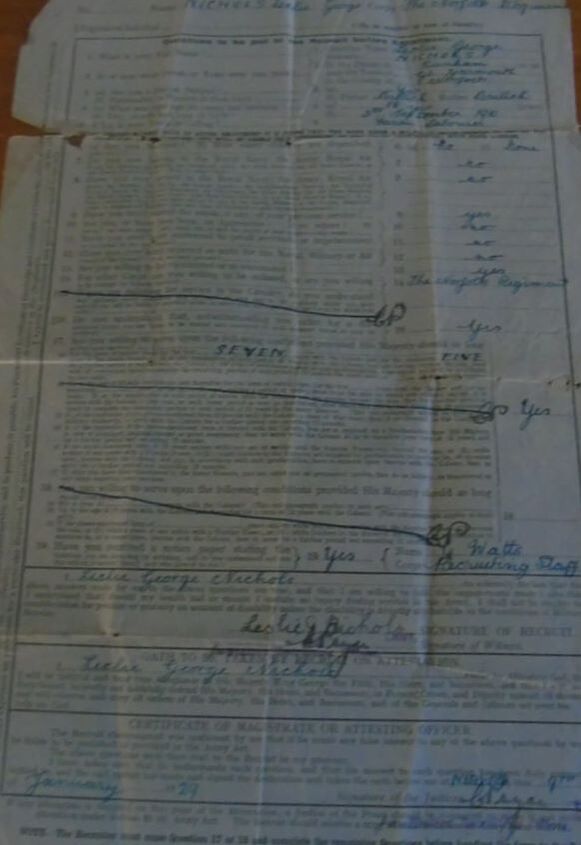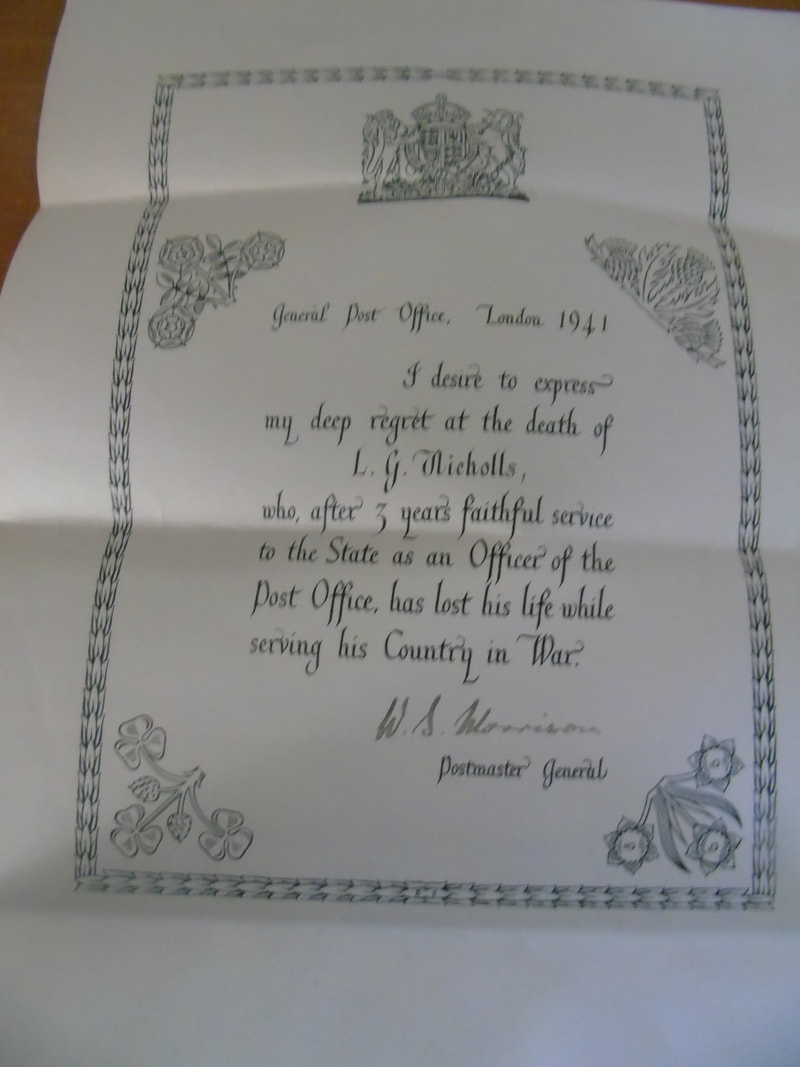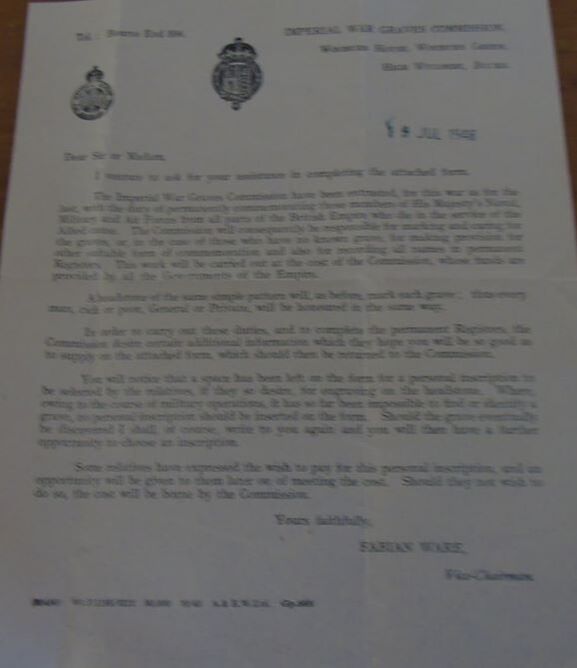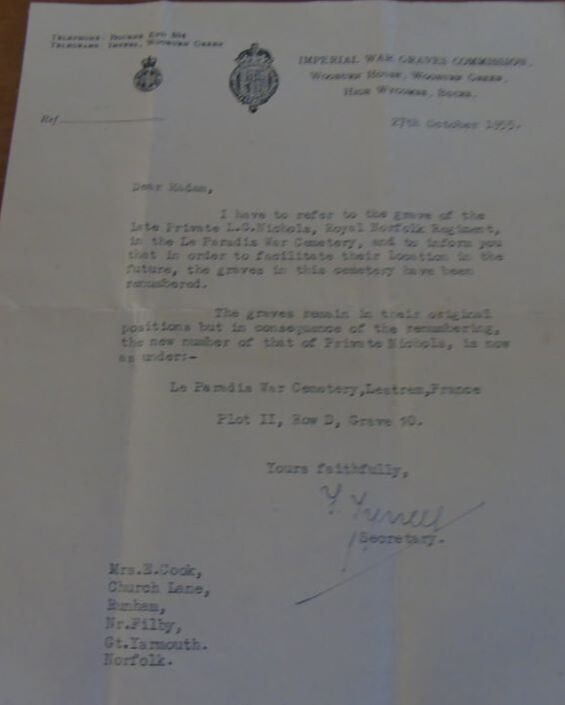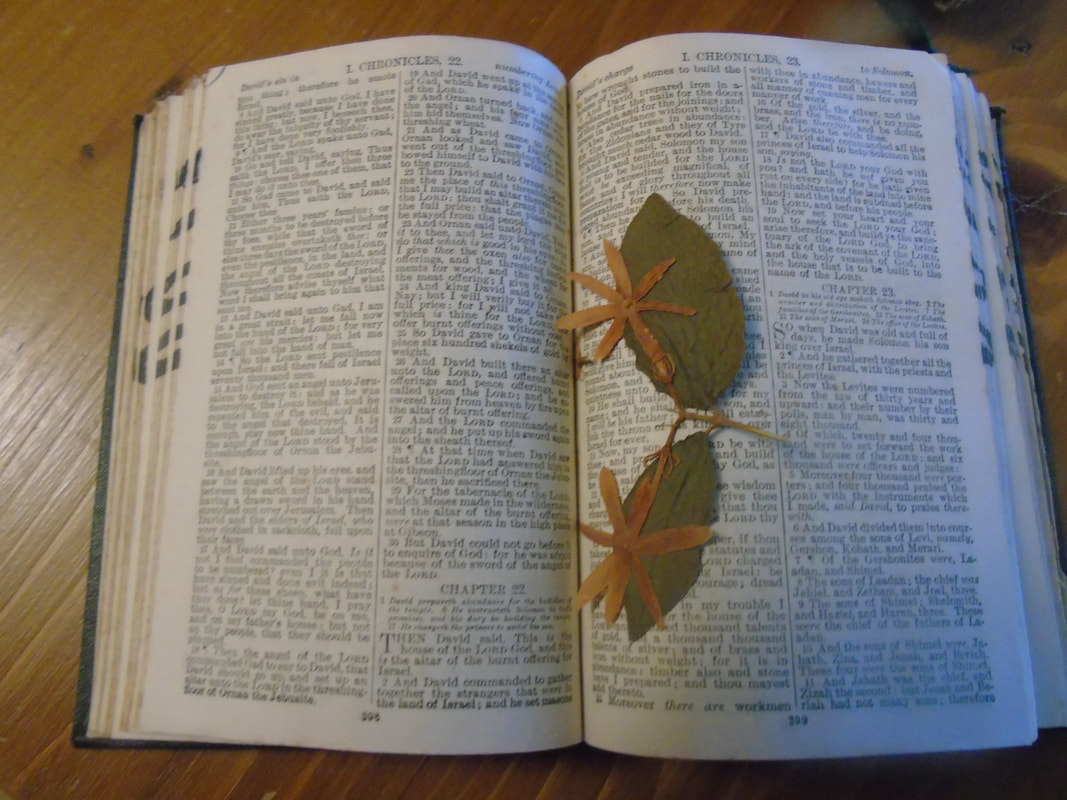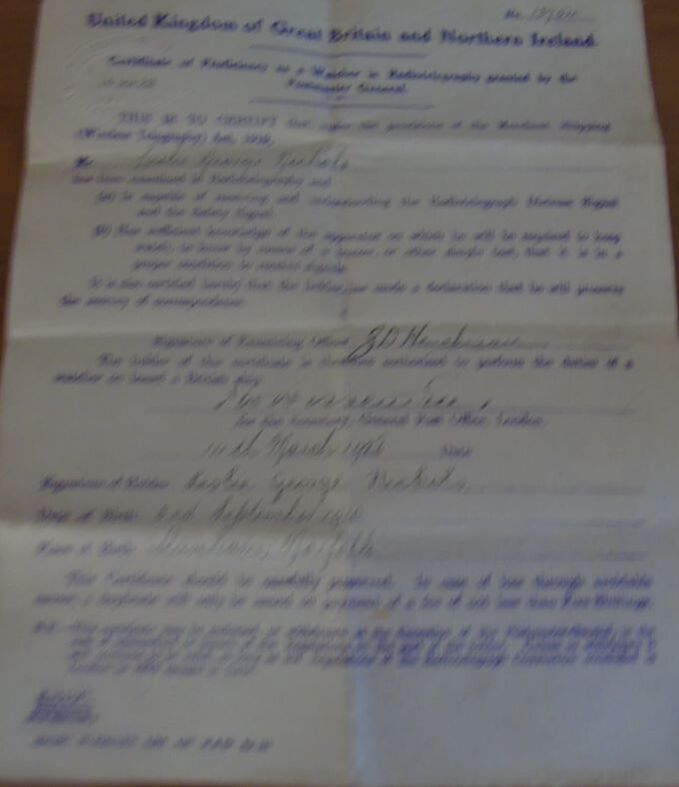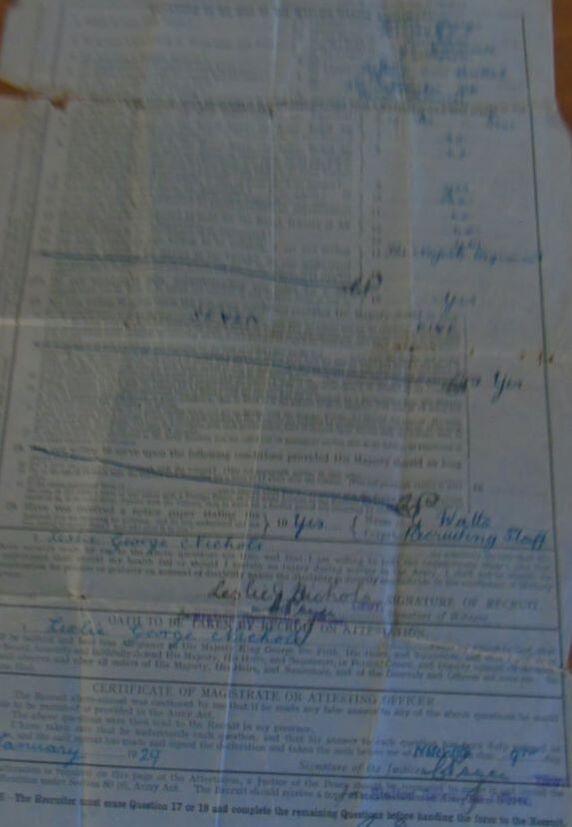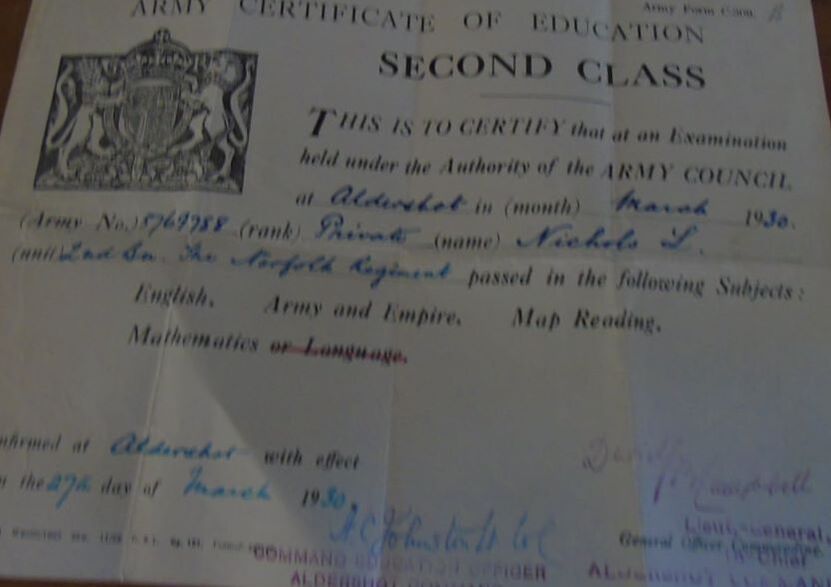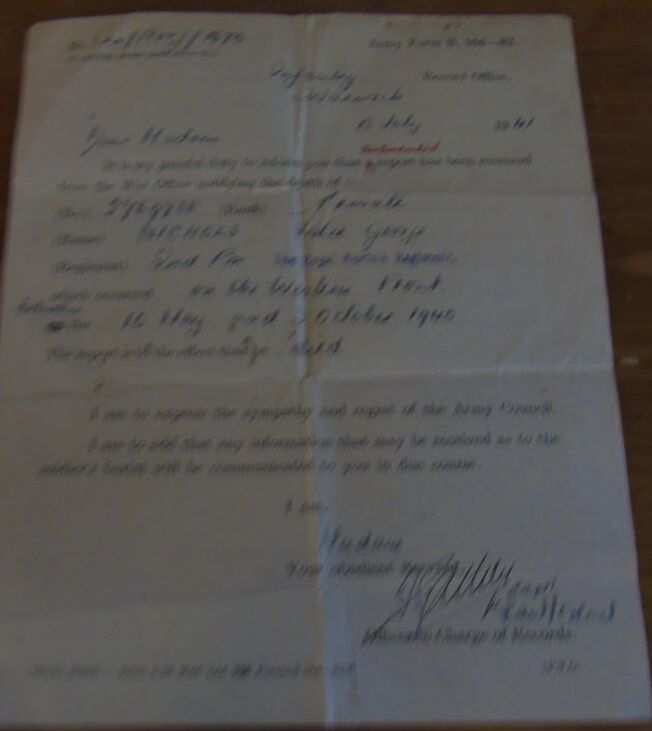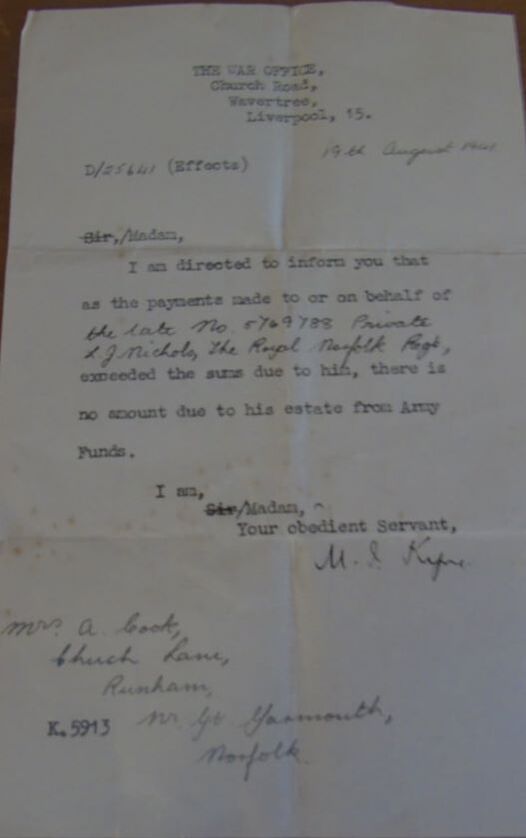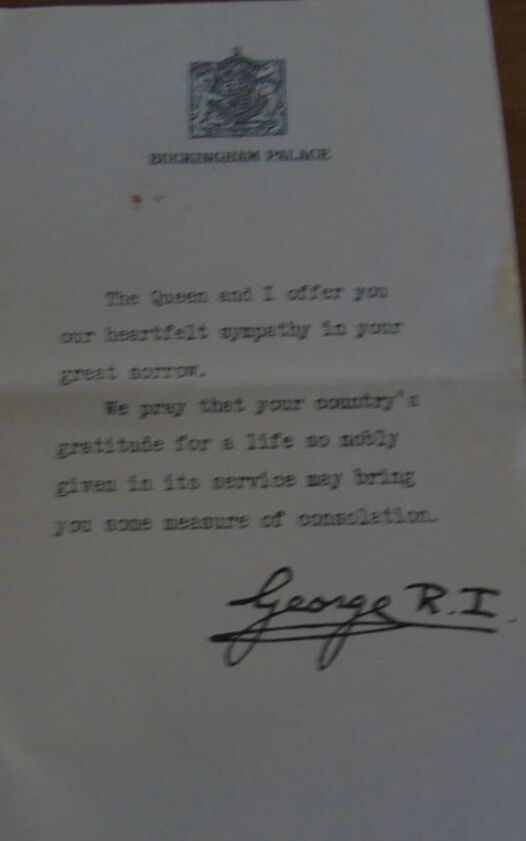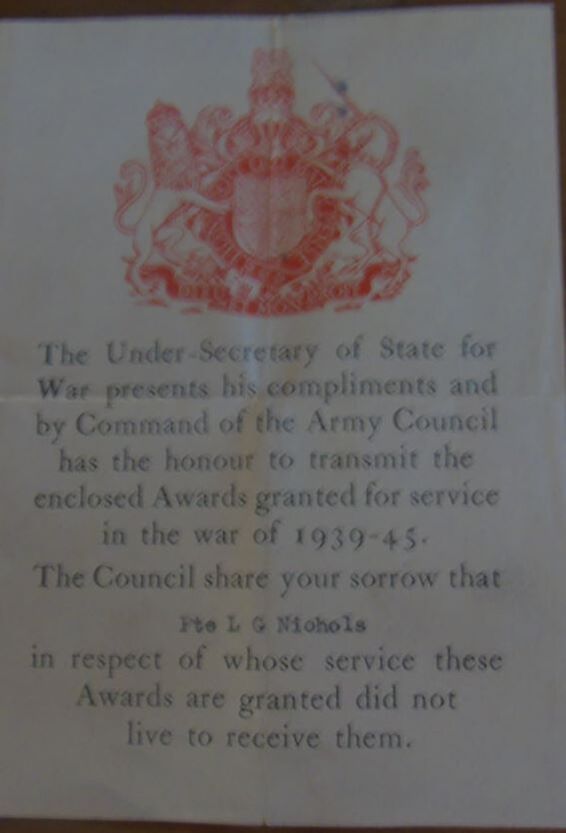Private Leslie Nichols
Private 5769788 Leslie George Nichols
Died 27th May, 1940
Aged 29
Son of Emily Nichols of Runham, Norfolk
Inscription Reads - Resting where no shadows fall. Peacefully sleeping he awaits us all.
Died 27th May, 1940
Aged 29
Son of Emily Nichols of Runham, Norfolk
Inscription Reads - Resting where no shadows fall. Peacefully sleeping he awaits us all.
Leslie George Nichols was born in Runham, Norfolk, on September 3rd, 1910, and was baptised in Runham Church on September 16th, 1910. He was the eldest child of Eddie George Nichols and Emily Nichols (nee Childs) and brother of Eddie John, Leonard and Verdun. He also had a half brother, George, following his mother's 1927 marriage to Albert Cook.
Leslie, who was known to everyone as Les, was just eight years of age when his father was killed in the First World War in France on March 21st, 1918. Before joining the army, Les worked for a time for the Post Office. After joining the Royal Norfolk Regiment, he saw service in India and China before fighting for the British Expeditionary Force in Northern France. He was killed on May 27th, 1940 during the Le Paradis Massacre.
Today his nieces Nancy and Julie still live in Norfolk and have been piecing together details of his life.
They are the children of Les' brother Eddie. They were, like so many others, aware of the fact their uncle had died in the war but oblivious to just where and how. Gradually the pieces of the jigsaw fell into place as they began to look through a case filled with photographs and other memorabilia. Les was a very fastidious man, not only taking many photographs of his service in India but also meticulously labelling them in albums.
Julie and Nancy told us that, although they didn't know much about their uncle, they knew their father was badly affected by his death. Eddie was just two years younger than his brother but looked up to him:
"At Christmas Dad could be quite miserable and as youngsters we always wondered why. But as you get older you begin to understand what it must have been like to lose a brother in the war. At Christmas dinner he would talk about the people who should have been there," Nancy and Julie said, adding that the older they get the more interested they become in what happened to Les.
Their search for details about Uncle Les was aided by a chance meeting in the village of Runham where Julie lives. Les' cousin, Wendy Pervin, was visiting the village and researching her ancestors and family tree. A friendship was struck up and many more details emerged.
Julie admits that when she found out almost 80 years after his death that Les had been killed in the massacre, she burst into tears after realising that if he had survived the war she and Nancy would have been able to get to know him.
Today they have searched their memories and come up with a couple of family anecdotes prompted by finding artwork by both Les and his brother Eddie which, remarkably, had been drawn during their time at school and kept by a teacher.
One anecdote came from the boys' early days growing up in Runham where they would swim in the river. One day the tide was so low that Leonard dived in and got stuck in the mud. Les had to help pull him out.
On other occasions the young Nichols boys would stand by the side of the River Bure at Runham and sing songs to the passengers passing by on the "Queen of the Broads" pleasure boat and other craft. Passengers on board would throw them pennies. This is depicted in some of the boys' artwork.
Both Nancy and Julie believe their father and uncle would be proud to think that so many people are now remembering them.
We have also been contacted by Les' cousin Wendy Pervin who wrote the following to us: "Leslie is my first cousin once removed. My grandmother and his father were brother and sister. On a trip to France in 2010 I specifically wanted to visit the Arras Memorial to pay my respects to Eddie George Nichols (Leslie's father) who died on the 21st March, 1918, and on the way back to Calais we made a detour to visit Le Paradis War Cemetery to enable me to visit the grave of Leslie and all those who were massacred on that day.
I am very honoured to have paid tribute to my Great Uncle and his son, who sadly perished in France not far from each other but a long way from home."
Leslie, who was known to everyone as Les, was just eight years of age when his father was killed in the First World War in France on March 21st, 1918. Before joining the army, Les worked for a time for the Post Office. After joining the Royal Norfolk Regiment, he saw service in India and China before fighting for the British Expeditionary Force in Northern France. He was killed on May 27th, 1940 during the Le Paradis Massacre.
Today his nieces Nancy and Julie still live in Norfolk and have been piecing together details of his life.
They are the children of Les' brother Eddie. They were, like so many others, aware of the fact their uncle had died in the war but oblivious to just where and how. Gradually the pieces of the jigsaw fell into place as they began to look through a case filled with photographs and other memorabilia. Les was a very fastidious man, not only taking many photographs of his service in India but also meticulously labelling them in albums.
Julie and Nancy told us that, although they didn't know much about their uncle, they knew their father was badly affected by his death. Eddie was just two years younger than his brother but looked up to him:
"At Christmas Dad could be quite miserable and as youngsters we always wondered why. But as you get older you begin to understand what it must have been like to lose a brother in the war. At Christmas dinner he would talk about the people who should have been there," Nancy and Julie said, adding that the older they get the more interested they become in what happened to Les.
Their search for details about Uncle Les was aided by a chance meeting in the village of Runham where Julie lives. Les' cousin, Wendy Pervin, was visiting the village and researching her ancestors and family tree. A friendship was struck up and many more details emerged.
Julie admits that when she found out almost 80 years after his death that Les had been killed in the massacre, she burst into tears after realising that if he had survived the war she and Nancy would have been able to get to know him.
Today they have searched their memories and come up with a couple of family anecdotes prompted by finding artwork by both Les and his brother Eddie which, remarkably, had been drawn during their time at school and kept by a teacher.
One anecdote came from the boys' early days growing up in Runham where they would swim in the river. One day the tide was so low that Leonard dived in and got stuck in the mud. Les had to help pull him out.
On other occasions the young Nichols boys would stand by the side of the River Bure at Runham and sing songs to the passengers passing by on the "Queen of the Broads" pleasure boat and other craft. Passengers on board would throw them pennies. This is depicted in some of the boys' artwork.
Both Nancy and Julie believe their father and uncle would be proud to think that so many people are now remembering them.
We have also been contacted by Les' cousin Wendy Pervin who wrote the following to us: "Leslie is my first cousin once removed. My grandmother and his father were brother and sister. On a trip to France in 2010 I specifically wanted to visit the Arras Memorial to pay my respects to Eddie George Nichols (Leslie's father) who died on the 21st March, 1918, and on the way back to Calais we made a detour to visit Le Paradis War Cemetery to enable me to visit the grave of Leslie and all those who were massacred on that day.
I am very honoured to have paid tribute to my Great Uncle and his son, who sadly perished in France not far from each other but a long way from home."
Family Photos
Artwork
The following artwork is by Les and his brother Eddie and is taken from the collection of Julie Nichols and Nancy Land and used with their kind permission. Click on the photographs to enlarge them.
Documents
Click on the images to enlarge them
|
Memories
Bob Brown recalls that Leslie Nichols was known as "Nod" when he joined Bob's signals platoon. In his memoirs Bob recalls the following: "The reservists we had come to the Signals were a good lot of men, all ex 1st battalion who had served in India. Some of these I got to know very well, John Hagan, "Nod" Nichols, "Porky" Ward and Arty Reeve. |
At a later date Bob Brown recalls: "Nod Nichols from the Signals was going on the same leave as me so I had company right through to Norwich (Editor's Note: This would probably have been March 1940).
"On the return I met Nod and a pal of his at the station (Thorpe Station, Norwich) and then we were on our way to London. By the time we got to Liverpool Street Station they were much the worse for drink and I had quite a time getting them down to the Underground. Eventually I managed it but they decided to go to the toilet, they dumped all their kit on the platform and left me to look after it. The trains kept coming and going and I at last managed to get them on one.
"The next struggle was at Victoria. We got our passes stamped and onto a train. By the time we reached Dover they had had a sleep and sobered up enough to walk up the hill to the rest of the camp."
"On the return I met Nod and a pal of his at the station (Thorpe Station, Norwich) and then we were on our way to London. By the time we got to Liverpool Street Station they were much the worse for drink and I had quite a time getting them down to the Underground. Eventually I managed it but they decided to go to the toilet, they dumped all their kit on the platform and left me to look after it. The trains kept coming and going and I at last managed to get them on one.
"The next struggle was at Victoria. We got our passes stamped and onto a train. By the time we reached Dover they had had a sleep and sobered up enough to walk up the hill to the rest of the camp."
